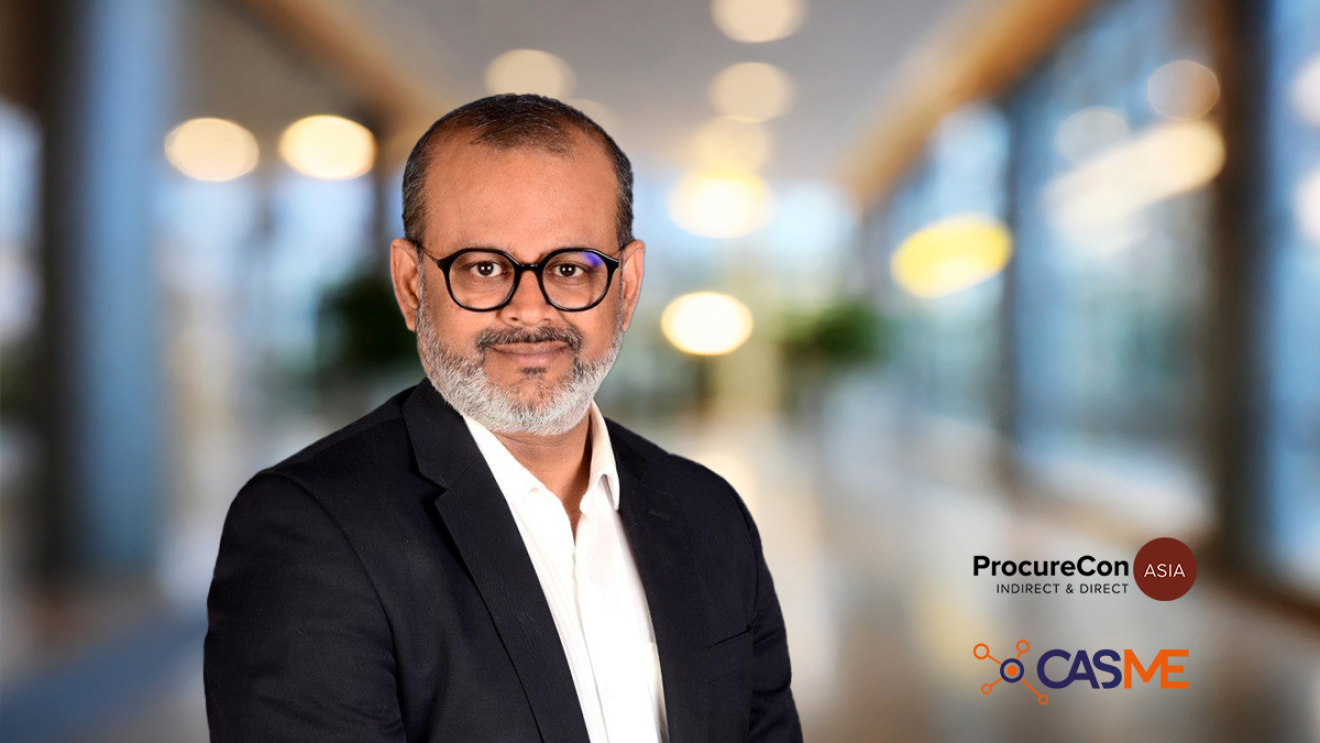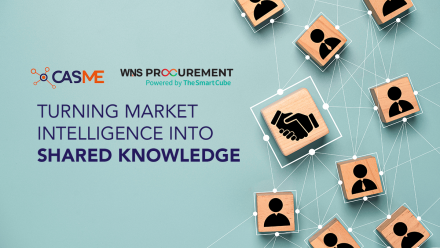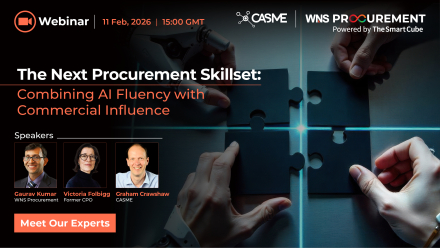
Srinivasan Ramakrishnan, known by his colleagues as ‘Srini’, is Vice President & Global Head of the Global Procurement Services team at Schneider Electric, and an active member of the CASME community. He has over two decades of Sourcing and Procurement experience with a key speciality in Shared Services Innovation, and he will be speaking at ProcureCon Asia in July 2024.
What has been your procurement career journey?
My professional life spans a wonderful 27 years, starting off as an IT Category Buyer and eventually leading the entire Indirect Procurement function at Schneider Electric. Over the years, I’ve had the opportunity to see the procurement world transforming from a purely functional part of an organisation to a driver of innovation. With further changes expected in the next decade, especially in the space of artificial intelligence and machine learning, I expect the expanding procurement function to be more tech-functional and transformational in nature.
I would introduce myself as a transformational leader who uses the process of social influencing to maximise the efforts of others towards achieving a specific goal. My vision is to always deliver year-on-year productivity whilst also positioning the organisation for growth. This involves building competency within the procurement community which helps generate insight for the enterprise. I strongly believe that this transformational leadership mindset has inspired teams to work through complex transitions and challenges, fostering a culture of continuous improvement, and an ability to motivate and steer teams during pivotal changes.
Using three core Strategic Pillars – Simplification, Synergy and Scale – we have embarked on a journey to transform Schneider Electric’s Global Procurement Services to the next level of performance and efficiency, establishing a direct relationship between performance and tangible business results.
We are beginning to see the results of this change. Recent awards and recognition are testament to the team’s successful performance, having received ‘Best Shared Services Team’ and ‘Best Shared Services Leader’ at the 12th Shared Services Summit and Awards Forum in 2023. We were also awarded the prestigious ‘Visionary Leader in Global Procurement Services’ at TIMES POWER ICON 2024, hosted by the Times Group of India. This event identifies those organisations and professionals who have made an immense contribution to the Indian and International economy.
What are some of the key procurement challenges that you are experiencing specifically in the Asia region?
Like any other organisation’s supply chain, we are impacted by both macro and global forces; for example, COVID in 2020, all the way through to the Ukraine-Russia war and everything else going on in the world today.
Crisis management is no longer a requirement that comes and goes, it’s just the way things are now. Procurement and supply chain leaders need to rethink how they organise their teams to build more agile, resilient, and sustainable supply chains. This also includes being able to better anticipate the next waves of disruption by systematically building resilience in the form of ongoing supplier risk management, business continuity planning, inventory buffers, and building competencies across the complete procurement landscape.
An approach to continuous improvement, a transformative mindset, and a balance between workforce development and technology augmentation, plays a key role in this respect. There are multiple strands to any procurement function but it’s not a case of ‘either/or’ when considering resources such as labour and tech. My bet is placed simultaneously on people and digital competency.
We need to equip our people with the best technologies possible for them to thrive. Supply chain transformation has recently revolved around aligning all processes and data on one platform, automating key processes, and using artificial intelligence (AI) and machine learning (ML) to help filter and analyse the extensive amounts of data we have to deal with. All with a view to better identify, predict and prevent problems.
In Procurement, you need to constantly evolve how you develop your supply base and this calls for more robust digital intervention across the digital eco-system to ensure a single version of truth. Not only does this ensure customer reliability and employee satisfaction, but it aids areas of compliance, ethics, and sustainability as well.
Within Procurement specifically, we will continue to focus on guiding processes through enterprise automation, AI and ML, and greater analytics engines to give our people the best chance possible of dealing with information that is relevant, timely and customer-serving.
What skill sets are essential for procurement success in the evolving digital world?
Despite the importance of digital literacy in Procurement, skills development and recruitment have not kept pace with technology. Not surprisingly, many feel that they don’t have the skill sets on their team to fully embrace digital tools and processes.
Organisations are not investing enough in the training and professional development required to maximise their technological capabilities. The first step is understanding where to invest when planning for development and upskilling. In a rapidly advancing landscape, digital skills are most in demand. What skills should be prioritised? How can the most crucial skills gaps be identified?
From my perspective, the top six areas where a procurement team should invest in technology skills development are:
- Data analytics and business intelligence
- Supply chain digitisation
- Contract and vendor management systems
- Cybersecurity and risk management
- Supplier relationship management (SRM) tools
- Artificial intelligence and automation.
By developing these digital skills, Procurement can drive innovation, streamline processes, mitigate risks, and contribute significantly to organisational success. Continuous skills development in these areas will empower procurement professionals to leverage the latest technology that will bring the most value to their team and organisation.
As the procurement function evolves, the value of tech skills will only continue to grow. Procurement professionals who invest in their digital expertise and stay curious about technology will be sought-after for their ability to optimise supply chains, uncover valuable insights from data, build strong supplier relationships, and drive innovation.
How can you create a Procurement leadership mindset?
I would like to take this one further - it’s not just about Procurement leadership, it’s about leadership applicable to any business function. Leadership is now considered by many to be the ‘master competency’ needed to make wise decisions and take effective action amid complex and rapidly changing conditions. It is a behaviourally-specific framework that identifies where leaders are in their development from being tactical problem solvers to strategic managers, to visionary capacity-building leaders. Many leaders will begin their development as an authority of a practice, trade, or domain. Some leaders will develop a capacity to influence and align people towards a common goal. Yet only a few leaders will grow into a change agent of others, their team and the organisation.
One prominent source of this framework is the work of Bill Joiner and Stephen Josephs, who elaborated on these ideas in their book: ‘Leadership Agility: Five Levels of Mastery for Anticipating and Initiating Change’. Their research shows how leaders can develop through these stages to become more effective in complex, dynamic settings.
How can procurement team talent and resource allocation be optimised to achieve efficiencies?
Aligning personnel development with targeted digital transformation initiatives is the key to success. The key word is ‘impact’, and in this respect, we should focus on developing five core capabilities:
- Agility
- Innovation
- Customer centricity
- Efficiency
- Digital transformation.
These capabilities are intangible assets; outcomes resulting from investments in talent and workforce development. We will need to invest in the development of our people by having a structured plan to assess and close the critical skill gaps through education, experience and exposure. Leaders should use a growth mindset to coach and give feedback on performance, development, and career paths. This helps to create opportunities and an environment for people to learn and grow. At Schneider Electric, we aim to upskill our people in critical skills such as Lean Six Sigma, project management, digital technologies, as well as functional expertise to achieve results with efficiency and innovation.
We will need to curate programmes to create succession plans and develop high potential talents through exposure to cross-functional, cross-regional projects, mentoring, and other talent development initiatives. These nurture trusting relationships, encourage extra effort, and make people believe in their abilities to form a culture of high performance.
Attitude is something that cannot be taught, which is why we seek out people with the right mindset, and then focus on building competencies thereafter. These development themes revolve around the end-user experience, continuous improvement, and realising that data is of paramount importance. When the right attitudes synergise with optimal understanding of these areas of our business, then the procurement vision can be realised.
Why would you recommend attending ProcureCon Asia? What are you particularly anticipating and looking forward to seeing there?
I have been following ProcureCon Asia for quite some time; however, due to other commitments I have been unable to attend - until now. The conference agenda has a deep focus on evolving trends in Supply Chain and Procurement, and it will be an ideal opportunity to hear various industry stalwarts speaking and sharing their experience and knowledge.
ProcureCon Asia takes place from 9 - 11 July 2024 at the Equarius Hotel, Singapore. Procurement professionals can gain 15% discount off the ticket price, using the code CASMEASIA15. Book now
Back to News



